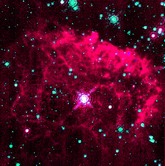World Building
Posted by hyperpat on April 12, 2007
My last post on the ‘wizard effect’ was written with a little bit of tongue-in-cheek, but it was meant to illustrate something that I see happening all the time in poor and even average level fantasy books: a failure to consider all the ramifications of whatever magical thing is present in the story. And fantasy novels are notoriously weak in the area of economics. It is not enough to draw up a pretty map, select your wayfarers for your quest, and define your battles. There needs to also be some serious world-building done, and at least part of that world-building should be figuring out how the average yeoman manages to make a living, just what industries and trades exist and how they all interact. Now many writers may figure that all this effort is not really required, that the traditional middle-ages economic scenario can be pretty much assumed, and to some extent this is correct, as long as whatever story is being written really does fit into this kind of background and there are no plot actions that will disturb the status quo. Sometimes determining just what will disturb that status is not all that obvious, as my little fable illustrates.
Ursula K. LeGuin’s Wizard of Earthsea set is one of the better fantasies out there, and one of the reasons for it is that she did consider some of the ‘unintended consequence’ effects that can ensue from use of magical powers. One of her prime themes within this work was the need for balance, which she often illustrated with a look at what the average person was doing. The background of her world was obviously detailed, though she rarely did any direct exposition of that background.
This same rule applies to science fiction. Often it is the little things in some imagined future or deep-space world that will give the whole that ‘real world’ feel that is so necessary to the ‘suspension of disbelief’ that works in these genres require. Heinlein was a master at this. In his Space Cadet (1948), wading through the waters of Venus (hot and wet was the common scientific opinion of this planet at that time) was not a very nice swim, as Heinlein recognized that with no moon, there would be no significant tides to churn upper and lower water layers, allowing them to become very stagnant. A tiny point, but it adds significantly to the ‘feel’ of this world as a real place. Although the three days he and his wife spent manually calculating (no computers back then!) a Hohmann transfer orbit to verify the veracity of a single sentence in that book is probably carrying this a little too far.
Frank Herbert’s Dune, one of the true classics of the field, also benefited mightily from having taken the time and effort to create a complete background. Many readers have remarked on the incredible interplay between so many different elements present in this book: government and politics, both the underpinnings of religion and its effect on different types of cultures, ecology, genetic manipulation, ancient ‘history’ with its effects on attitudes about things like computers and robots, military strategy, and most significantly how vital commerce is held in thrall to the mental-enhancing effects of ‘spice’, as without it transportation of goods, services, and personnel would take much longer and be more expensive.
Thinking globally about every aspect of an envisioned imaginary world is not easy or trivial and it is very time consuming. Since it does take so much effort, once a writer has created his world, there is a very strong temptation to set the next story in the same world, which leads to the multiple book ‘series’ phenomenon so common today. There’s nothing wrong with this per se; readers, having grown used to a particular world/universe, feel more comfortable revisiting it – its now familiar, a worn and comfy couch. But it can lead to a stultifying round of re-treads, effectively telling the same story over and over, with nothing new and exciting. There’s also a temptation to directly delineate all those nifty details about your world that you’ve thought up, which is a bad idea, as then all this ‘background’ material will tend to drown out the story that you’re trying to tell.
The more I think about these aspects of these genres, the more it becomes obvious just how difficult it can be to write really good stories within their confines. Perhaps that’s why there is so much of this material that is not very good and is eminently forgettable. But when it is done right, the end result justifies all the effort, as these fields can tell stories that illuminate aspects of the human condition that either can’t be shown in ‘normal’ literature or at least are very difficult to portray. Those critics that look down their noses at these fields as ‘entertainment only’, insignificant literature, are not only missing the boat, they are depriving themselves of what can be a mind altering experience.



fencer said
That’s so true… the little detail or details that drag you into the story. The author really has to imagine, not just put a bunch of stereotypical text together, and the imagining has to allow for opposites to appear and resolve themselves in unusual ways. I guess I’m thinking of things like in a Canticle For Liebowitz when a shopping list becomes a holy relic of the New Church. Real life has this absurd component.
Regards